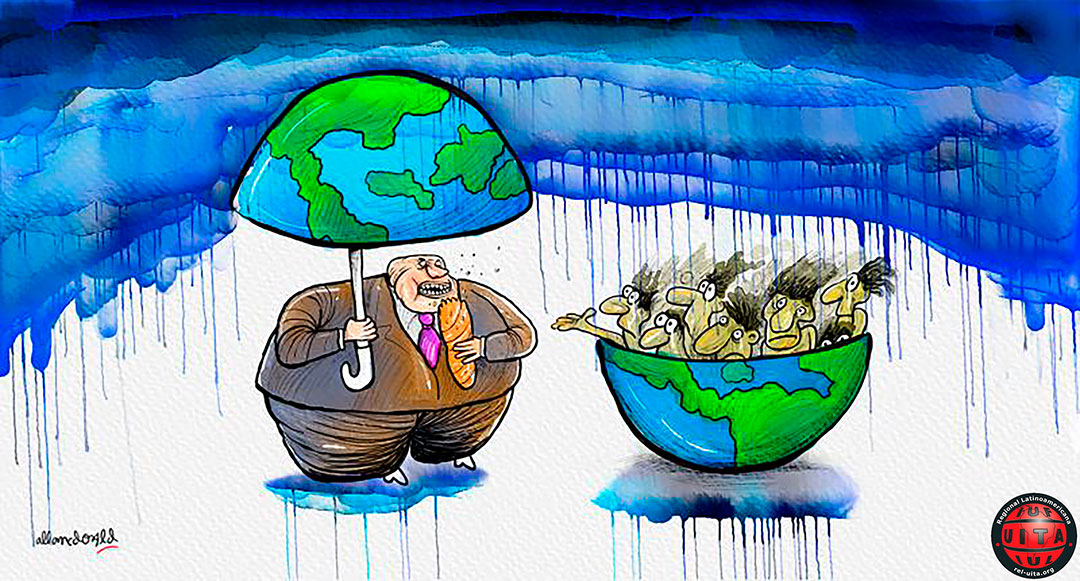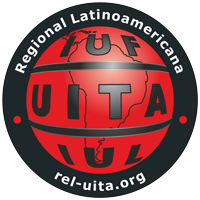Davos inside and out
Just two days before Argentine President Javier Milei, in one of his most outrageous speeches yet, delivered at the World Economic Forum (WEF) in Davos, declared that humanity was experiencing its most prosperous and just era, the non-governmental organization Oxfam issued a report on inequality and poverty in which it stated practically the opposite.
Daniel Gatti
25 | 1 | 2024

Illustratrion: Allan McDonald
It has become customary, in the days leading up to the annual meeting of the rich and powerful that is the WEF, for Oxfam, an association of faith-based non-governmental organizations created after the Second World War in Oxford, England, to release a report on poverty in the world.
Oxfam’s reports invariably hover over the debates at the Davos Forum, an event first held in 1971, organized by Swiss economics professor Klaus Martin Schwab to reflect on the best ways to ensure a joint planetary governance, with the participation of multinational corporations, certain governments, and selected civil society organizations.
These reports are like the B-side of the Forum, the irritating bit that is nonetheless “necessary to give us a reality check,” as Schwab has been known to say on occasion.
Also frequently invited to Davos is a token maverick, who takes the opportunity to tell the beautiful people gathered at the exclusive Swiss Alps town a thing or two. This year it was Gustavo Petro, the president of Colombia.
It is all part of the folklore of the Forum.
The Oxfam 2024 report is anything but ambiguous. Its title alone —Inequality Inc.— says it all. And the data it presents and the observations it makes leave no room for doubt.
It says, for example:
“A huge concentration of global corporate and monopoly power is exacerbating inequality economy-wide. […] Through squeezing workers, dodging tax, privatizing the state and spurring climate breakdown, corporations are driving inequality and acting in the service of delivering ever-greater wealth to their rich owners.”
It notes, among other things, that since 2020 the combined wealth of the five richest men in the world grew more than twofold, going from 405 billion to 869 billion US dollars, while the combined wealth of the poorest 60 percent, some 5 billion people, shrank.
And it adds a fact that complements the above information and evidences the accumulation of wealth at the top: “Seven out of ten of the world’s biggest corporates have either a billionaire CEO or a billionaire as their principal shareholder.”
“At current rates, it will take 230 years to end poverty, but we could have our first trillionaire in 10 years.”
The gap between rich and poor has its North-South correlate: today the countries of the so-called Global North, despite being home to only 21 percent of humanity, concentrate almost 70 percent of private wealth.
While Oxfam played on the guilty conscience of the billionaires and super corporate executives gathered in Davos, Javier Milei was telling them instead to abandon all qualms and continue amassing riches, because that was the only way for the world to “keep moving forward” and that they would be rewarded for it with the kingdom of heaven.
Such starkly brutal praise for the purest “free market capitalism” does not always sit well with some capitalists, who would prefer to be recognized for their philanthropy rather than for their greed.
That is how it always is in Davos: someone cries, someone clamors for more taxes, someone else declares that so much disparity is intolerable, and another—more lucidly—notes that if the gap keeps widening it could even be counterproductive, as it might cause unrest, spark uprisings, and provoke the wrath of the exploited.
Oxfam called for a shift: “States must urgently prioritize public services, push for greater regulation of large corporations, end monopolies and the excessive power of the market, and institute permanent taxes on wealth and excess profit.”
The Argentine president on the contrary urged participants at the Forum to do away completely with the state, which he called the source of all evil, a generator of pernicious equalities, and a downward equalizer, and he criticized the leaders of rich countries who had succumbed to the siren call of “socialism” and given the state some margin of intervention.
“I am here to tell you that the Western world is in danger (…) because those who are supposed to defend the values of the West are co-opted by a vision of the world that inexorably leads to socialism,” and consequently to “poverty,” and that has made them “abandon the model of freedom for different versions of what we call collectivism,” the Milei said.
And he called on them to forget all that nonsense of climate change, which “does not exist,” or the gender agenda, which he called utterly ridiculous.
The more well-meaning persons in the audience were shocked.
Milei goes too far with his political incorrectness, he is too brutally extreme. And the billionaires and businesspersons, who would normally indulge him, may not be too keen on flirting with a character who is not even capable of realizing that greenwashing can be used to their advantage to hide the environmental pillaging and the rampage they publicly criticize while regularly engaging in it.
Kristalina Georgieva, managing director of the International Monetary Fund, is not one to be squeamish. She knows what she wants. Rumor has it that she followed Milei down the corridors of the venue in Davos, to pose next to him, smiling and pulling some of the faces the Argentine president is famous for.
“For now Argentina is doing well,” Georgieva said in Switzerland, referring to a country that is sinking deeper and deeper into poverty, destitution, and inequality, a situation her institution has done so much to further. Just as it has contributed to shape the world described in Oxfam’s report.

